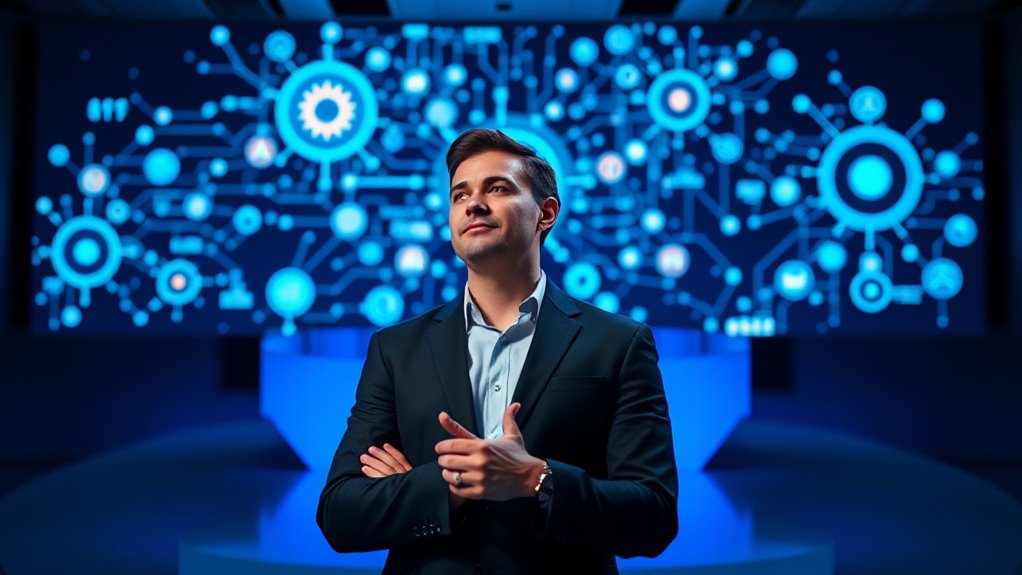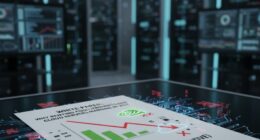To stay relevant in the AI era, focus on developing skills that machines can’t replicate, like creativity, emotional intelligence, and ethical leadership. Cultivate your ability to solve complex problems, understand emotions, and guide teams ethically. Emphasize continuous learning, critical thinking, and resilient adaptation to new technologies. Building strong relationships and fostering innovation will set you apart. Keep exploring, and you’ll discover more ways to enhance your human-centric skills for this evolving landscape.
Key Takeaways
- Develop emotional intelligence and empathy to foster trust, collaboration, and leadership in human-AI partnerships.
- Enhance critical thinking and ethical judgment to evaluate AI outputs and ensure responsible decision-making.
- Cultivate creative problem-solving and innovative thinking to push boundaries beyond AI capabilities.
- Build resilience and adaptability to navigate changing work environments and continuously learn new skills.
- Strengthen relationship skills such as communication and conflict resolution to maintain effective teamwork in hybrid settings.
Embracing Creativity and Innovation in a Tech-Driven World

In a world increasingly shaped by technology, embracing creativity and innovation means recognizing that human traits still hold a distinct advantage. While AI can analyze patterns, generate ideas, and produce art, it often lacks the nuance and emotional understanding rooted in human experience. Your role isn’t replaced but enhanced—AI tools accelerate idea generation and uncover hidden connections, boosting productivity by up to 40%. However, it’s your judgment that refines and curates these outputs, ensuring relevance and depth. Collaborating with AI allows you to push creative boundaries further. To thrive, you need to develop skills that leverage this synergy—focusing on creative problem-solving, conceptual thinking, and emotional insight—keeping your uniquely human perspective at the forefront of innovation. Understanding best modern toilet systems can also serve as a reminder that integrating innovative solutions requires both technological advancement and human oversight. Recognizing the importance of human judgment in evaluating AI-generated ideas helps maintain quality and authenticity in your work. Additionally, developing strong emotional intelligence can improve your ability to interpret nuanced data and foster better collaboration with AI tools. Furthermore, cultivating cultural intelligence enhances your capacity to navigate diverse perspectives, enriching your creative processes and fostering inclusive innovation. Staying informed about emerging technologies like Snapdragon 8 Gen 3 AI capabilities ensures you can better harness AI’s potential in your creative endeavors.
Developing Human-Centric Leadership and Strategic Insight

As AI transforms the workplace, leadership that centers on human values becomes more important than ever. You need to prioritize well-being, ensuring AI deployment benefits people rather than just profits. Ethical considerations are critical—leaders must promote fairness and prevent harm. Emotional intelligence, empathy, and inspiration are essential human skills that foster trust and engagement. To succeed, organizations should invest in training and governance that emphasize human-centric priorities. Developing strategic insight involves leveraging AI’s data analysis and predictive capabilities to identify trends and opportunities. 70% of global CEOs prioritize AI, investing heavily for competitive advantage. Meanwhile, understanding the impact of Natural Language Processing (NLP) can help leaders better tailor customer interactions and internal communications. Additionally, staying informed about color accuracy and calibration can improve the quality of visual outputs in AI-driven design processes. Recognizing the importance of home organization skills can also enhance workplace productivity by fostering a more efficient environment. Furthermore, ongoing research into AI vulnerabilities and bias mitigation underscores the need for continual oversight and responsible AI development. Yet, AI’s decision support lacks ethical reasoning, so your role includes balancing technological insights with moral judgment. By redesigning work and organizational structures around human well-being, you can lead responsibly while harnessing AI’s full potential. Additionally, integrating AI security measures ensures that sensitive data remains protected as organizations rely more heavily on AI-driven systems.
Enhancing Critical Thinking and Ethical Decision-Making

How can you strengthen your critical thinking and ethical decision-making skills in an AI-driven workplace? Focus on continuous learning through online courses that teach you how to interpret AI insights and incorporate them into decisions. Challenge assumptions by revisiting norms and welcoming alternative perspectives. Collaborate across disciplines to gather diverse viewpoints. Use real-world scenarios to evaluate AI’s potential impacts ethically. Seek feedback actively to refine your approach. Remember, AI’s analytical power has limits—human judgment and ethics remain essential. To deepen your understanding, consider this table:
| Skill Area | Action Steps | Benefits |
|---|---|---|
| Critical Thinking | Question AI outputs regularly | Avoid over-reliance, foster insight |
| Ethical Evaluation | Analyze real-world scenarios | Ensure responsible decisions |
| Interdisciplinary | Collaborate with diverse teams | Broaden perspectives |
| Feedback & Reflection | Seek peer input | Refine judgment, build confidence |
| Continuous Learning | Take online courses | Stay updated, enhance skills |
In addition, staying informed about the latest research on AI’s limitations and biases can help you critically assess the technology’s recommendations and avoid blind trust. Developing a critical mindset is essential to navigate the complexities of AI ethically and effectively. Moreover, understanding the boundaries of AI can prevent overdependence on automated systems and promote human-centric decision-making. Incorporating ethical frameworks into your workflow can further support responsible AI use and reinforce ethical standards in decision-making processes. Cultivating an awareness of mindfulness can also enhance your capacity to remain present and attentive to ethical considerations during decision-making. Recognizing the importance of ethical hacking skills, such as vulnerability assessment and ethical decision-making, can further strengthen your ability to identify and mitigate risks responsibly in an AI-enabled environment.
Cultivating Emotional Intelligence and Relationship Skills

Building on the importance of critical thinking and ethical decision-making, developing emotional intelligence and relationship skills enhances your ability to navigate complex workplace dynamics. Emotional intelligence helps you recognize, understand, and manage your emotions while empathizing with others. This skill is increasingly valued, with HR managers ranking it over IQ, and demand is projected to rise 26% by 2030. Cultivating self-awareness, social awareness, emotional regulation, and empathy enables better leadership and teamwork. Developing relationship skills like effective communication, conflict resolution, and networking strengthens collaboration and trust. Despite its significance, only 42% of organizations offer EQ training, emphasizing the need for you to proactively enhance these skills. Recognizing the importance of performance metrics can help you track your progress in developing these skills and demonstrate your growth to employers. Incorporating mindfulness practices can further support emotional regulation and resilience in high-pressure situations. Additionally, understanding somatic therapy techniques can deepen your awareness of bodily sensations, fostering greater emotional regulation and stress management. Exploring alternative investments, like Gold IRA options, can also diversify your financial resilience, complementing your emotional and interpersonal growth.
Fostering Adaptability and Effective Collaboration in Hybrid Environments

The rise of hybrid work models demands that you develop new skills to stay effective and connected across diverse work environments. You need to master digital communication platforms and collaboration tools to bridge geographic and time-zone gaps. Self-management, including discipline and time management, becomes essential since less physical oversight exists. Flexibility in managing shifting schedules and work locations helps maintain productivity while meeting deadlines. To foster teamwork, establish clear communication norms like regular check-ins and designated channels. Inclusive practices, such as equitable participation in meetings, ensure everyone’s voice is heard. Additionally, problem-solving and adaptability are vital for overcoming coordination challenges and technology issues. Staying open to learning new processes and tools enables you to thrive in hybrid settings, supporting sustained engagement and collaboration globally, WFH levels have stabilized at around 1.3 days per week, ensuring that teams remain cohesive and productive.
Frequently Asked Questions
How Can Organizations Measure Creativity and Innovation in the AI Era?
You can measure creativity and innovation by combining human judgment with AI tools. Use metrics like novelty scores, feasibility ratings, and impact metrics to evaluate ideas. Incorporate multi-step assessments, peer reviews, and automated scoring to track development over time. Engage in human-AI collaboration for iterative refinement and cross-validation, ensuring your organization captures originality, practicality, and strategic alignment in your innovative efforts.
What Leadership Traits Are Most Effective in Ai-Augmented Workplaces?
Think of leadership traits as the compass guiding your team through the AI landscape. Your most effective traits include being visionary, setting clear strategies that inspire confidence. Emotional intelligence helps you connect deeply, fostering trust and collaboration. Data-driven decision-making sharpens your insights, while inclusivity guarantees diverse voices are heard. By blending soft skills with strategic foresight, you create an environment where AI amplifies human potential, driving innovation and engagement.
How Do Critical Thinking Skills Evolve With Advanced AI Tools?
You’ll find your critical thinking skills evolve as AI tools become more advanced. By actively questioning AI outputs, appraising their accuracy, and considering ethical implications, you deepen your evaluative abilities. As AI surfaces diverse data, you learn to synthesize information across disciplines and challenge assumptions. This ongoing process sharpens your judgment, making you more adaptable and insightful, ensuring your decision-making stays balanced, nuanced, and aligned with broader organizational and societal values.
In What Ways Can Emotional Intelligence Impact Ai-Human Collaboration?
Your emotional intelligence can transform AI-human collaboration into something extraordinary, almost like a symphony of understanding. When AI recognizes and responds to emotions, trust and empathy flourish, making interactions more genuine and engaging. You’ll find that emotionally intelligent AI enhances decision-making and teamwork, creating a harmonious environment. This approach makes AI feel more relatable, increasing user satisfaction and loyalty, ultimately leading to more effective and human-centric collaboration.
How Can Employees Adapt Quickly to Rapidly Changing Ai-Driven Roles?
To adapt quickly to rapidly changing AI-driven roles, you should embrace continuous learning and seek on-the-job training opportunities. Stay open-minded about new tools and workflows, and actively participate in upskilling programs offered by your employer. Building confidence in your AI skills and fostering a growth mindset will help you stay relevant and competitive. Remember, staying adaptable means being proactive about learning and ready to embrace change as it happens.
Conclusion
As you navigate the AI era, remember that your uniquely human skills—creativity, emotional intelligence, and ethical judgment—are your strongest allies. In a world where machines handle routine tasks, these qualities become your greatest assets, much like a knight relying on wit over sword. Embrace adaptability, foster collaboration, and lead with purpose. The future belongs to those who master the art of being human, even when tech takes center stage.









